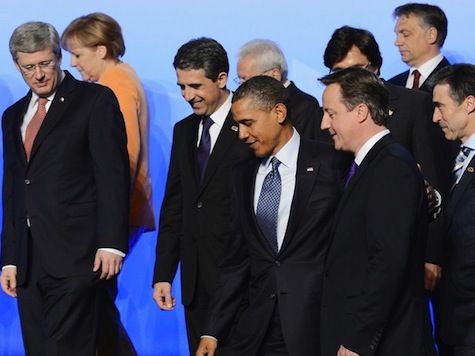This week’s NATO summit in Wales marks acritical moment in the history of the organization that has served as thebedrock of transatlantic security for 65 years. Absent a menacing Soviet Union,what was founded as a collective security alliance has, in recent decades, increasingly involved itself without-of-area operations.
It’s time for NATO to get back tobasics. Only by returning to its raison d’être can thealliance secure the future for its member states.
The North Atlantic region is full ofchallenges: a vast and resource-rich Arctic region up for grabs, growing cyberthreats, heightened concern about terrorism, energy insecurity… to say nothingof Russia’s resumption of military aggression.
With the fall of the Soviet Union, NATOsought to foster a new relationship with Russia based on mutual cooperation andrespect. Moscow’s invasion of Georgia in 2008 showed that Vladimir Putin’sRussia had no intention of forgoing aggression.
Although many did not want to believe thatrevanchism was back in Moscow, Russia’s invasion of Ukraine this March and itscontinued machinations against Kiev have removed all possible doubt. Revanchism is back, and with a vengeance.
Moreover, in gobbling up Crimea and itsmost recent assaults on Ukraine, Moscow has shown itself adept in waging a newbrand of warfare–one characterized by misdirection and use of unmarked troops.Russia has employed every tool in its arsenal, from hard power and subterfuge,to propaganda and economic, energy, and cyber warfare, to wage war in Ukraine. NATO needs to be prepared; Putin may be tempted to set his sights furtherwest.
At NATO’s inception, Harry Trumandescribed it as “like a group of householders, living in the same locality, whodecide to express their community of interests by entering into a formalassociation for their mutual self-protection.” What was true in 1949 remainsevery bit as true today. The alliance is a collective security pact tosafeguard the peace and freedom of democratic peoples who have banded togetherfor mutual protection. It is only as strong as its weakest link.
Lately, many householders have allowedtheir homesteads to fall into disrepair. The economies of many European NATOmembers are stagnant under the weight of expansive entitlements and onerousregulation. With few notable exceptions, defense spending for European NATOmembers is paltry. More problematic, much of the continent’s defense budgetsare consumed by personnel and administrative costs. The amount of money beingspent on security at the upcoming summit in Wales is more than eight times theamount of money Slovenia spends on new equipment every year, and half of whatBelgium spends every year on new kit.
With U.S. defense budgets shrinking andRussia proving insatiable, Europe’s general abdication of its responsibility tomaintain an adequate defensive capacity has left NATO members collectivelybehind the eight ball. Some countries are indeed ramping up defense spending,but it will take years for nations to once again reach the 2% of GDP investmentlevel they should never have fallen below.
Given the diverse and intensifyingsecurity challenges facing NATO members, the summit in Wales must lead the allianceback to its original mission and purpose: assuring the collective security ofits member states. How to do that? First, NATO must invest initself–i.e., in real military capabilities. And they must exercise together,frequently and in force; for this there is no substitute. Finally, a once-opendoor to new members–now seemingly closed–needs to be reopened: Macedonia is agood place start.
The last time a NATO summit was held inthe United Kingdom, the Soviet Union was disintegrating. Some may have wonderedthen what the purpose of the alliance would be moving forward. Today, afterdecades engaged in out-of-area operations, NATO should return to what it hasalways been: a collective security alliance.
In 1990, British Prime Minister MargaretThatcher said, “a sure defense is the foundation for everything else.” She wascorrect. For the future of transatlantic security, let us hope those words donot fall on deaf ears in Wales.
Daniel Kochis is a researcherin The Heritage Foundation’s Davis Institute for National Security and ForeignPolicy.

COMMENTS
Please let us know if you're having issues with commenting.